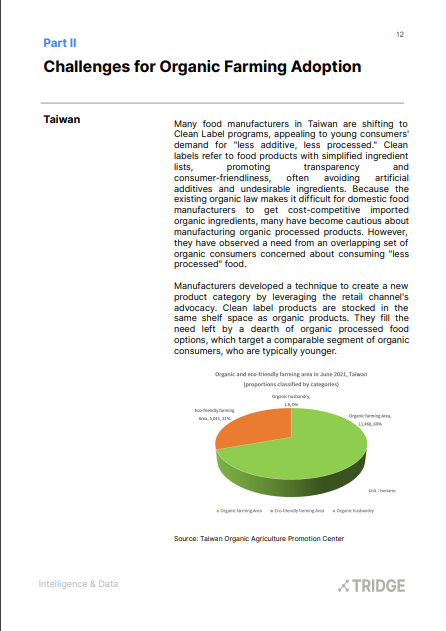Challenges and Opportunities for Organic Farming Adoption
Jaison John, Lei Wang, Bojan Mijatovic
Published Aug 26, 2023
PDF File Preview

1. Increasing Consumer Demand: Global demand for organics has stagnated post-pandemic, but people are seeking alternative methods to address food security and foreign exchange. Governments are crucial in building local markets by enacting demand-supporting policies, such as Brazil's state procurement regulations favoring organic growers. Consumers are still drawn to organic products due to concerns about pesticides and environmental care.
2. Environmental Benefits: Organic farming practices benefit soil, water, air, biodiversity, and ecosystem balance and contribute to global warming by reducing transportation energy and carbon dioxide emissions. They reduce pollution, nitrate leaching, and pesticide residue and increase profitability by cutting production costs while producing equivalent yields to conventional systems.
3. Yield and Productivity: Organic vegetable systems worldwide need solutions to close the yield gap and save labor. Innovations include seed selection, high-quality seedlings, and continuous soil amendments. Research shows organic and conventional yields are becoming more equivalent, indicating an opportunity for promoting organic vegetable cultivation.
2. Environmental Benefits: Organic farming practices benefit soil, water, air, biodiversity, and ecosystem balance and contribute to global warming by reducing transportation energy and carbon dioxide emissions. They reduce pollution, nitrate leaching, and pesticide residue and increase profitability by cutting production costs while producing equivalent yields to conventional systems.
3. Yield and Productivity: Organic vegetable systems worldwide need solutions to close the yield gap and save labor. Innovations include seed selection, high-quality seedlings, and continuous soil amendments. Research shows organic and conventional yields are becoming more equivalent, indicating an opportunity for promoting organic vegetable cultivation.
Table of Content
Part I - Overview - Challenges and Opportunities for Organic Farming Adoption
Part II - Challenges for Organic Farming Adoption
Part III - Opportunities and Sustainable Solutions for Organic Farming Adoption
Part IV - Key Take-away
Part V - Outlook
Related market data
Read more relevant content
By clicking “Accept Cookies,” I agree to provide cookies for statistical and personalized preference purposes. To learn more about our cookies, please read our Privacy Policy.




